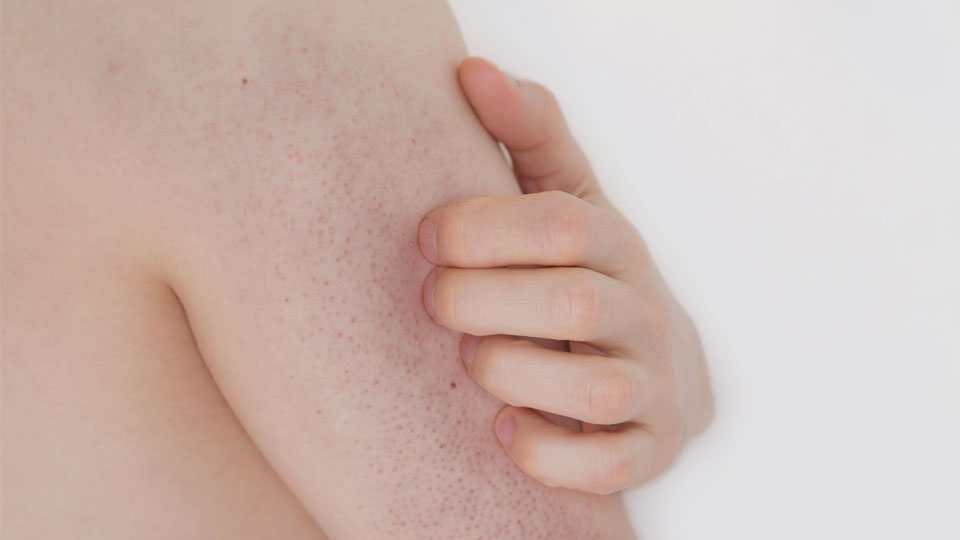Keratosis Pilaris Treatment In Mumbai

What is Keratosis Pilaris?
Keratosis Pilaris is a benign skin condition that occurs when keratin, a protein that protects the skin from infection and other harmful substances, builds up and blocks hair follicles. This blockage leads to the formation of small, rough bumps on the skin's surface, often with a red or inflamed appearance. The bumps can feel like sandpaper and may be more noticeable in colder weather or when the skin is dry.
Causes of Keratosis Pilaris
- Genetics: Keratosis Pilaris tends to run in families, suggesting a genetic component to the condition.
- Dry Skin: Dry skin can lead to increased keratin production and blockage of hair follicles leading to Keratosis Pilaris.
- Keratin Overproduction: Individuals with Keratosis Pilaris produce more keratin than usual, leading to the accumulation of this protein around hair follicles.
- Associated Skin Conditions: Keratosis Pilaris may be related to other skin conditions such as eczema or ichthyosis, although it can also occur on its own.
- Hormonal Fluctuations: Hormonal fluctuations, like those during puberty, pregnancy, or menstruation, may influence KP symptoms.
Symptoms of Keratosis Pilaris
The primary symptom of Keratosis Pilaris is the appearance of small bumps on the skin, typically:
- On the upper arms
- On the thighs
- On the buttocks
- On the cheeks (in some cases)
These bumps may be white, red, or flesh-colored and can sometimes be accompanied by mild itching or irritation. The severity of Keratosis Pilaris can vary from person to person, with some people experiencing only a few bumps while others may have a more widespread presentation.
Prevention of Keratosis Pilaris
- Moisturize Regularly: Keep your skin hydrated to prevent dryness and reduce the severity of KP.
- Exfoliate Gently: Regular exfoliation can help remove dead skin cells and prevent clogged hair follicles.
- Use a Humidifier: In dry climates or during winter months when indoor heating can dry out the air, using a humidifier can help maintain moisture levels in the skin.
- Manage Stress: Reducing stress through relaxation techniques and regular exercise can promote overall skin health.
- Follow a Healthy Diet: Eating a balanced diet rich in vitamins and minerals can support skin health.
When to See a Doctor
You may want to consult a dermatologist if:
- Your condition is causing significant discomfort, itching, or pain.
- You have concerns about the appearance of your skin and how it may be affecting your self-esteem.
- Self-care measures have not improved your symptoms or if they seem to be getting worse.
- You notice any signs of infection, such as pus-filled bumps, redness, warmth, or tenderness.
FAQs
No, Keratosis Pilaris is not contagious. It is a skin condition that is not caused by infection or bacteria.
While there is no known cure for Keratosis Pilaris, it can often improve over time with proper skincare and management techniques.
Shaving over KP bumps can sometimes cause irritation or exacerbate symptoms. If shaving is necessary, use a sharp, clean razor and make sure you moisturize the skin before and after shaving to reduce irritation.
Over-the-counter creams containing ingredients like alpha hydroxy acids (AHAs) or urea may help exfoliate the skin and improve KP symptoms. However, it's best to consult a dermatologist before starting any new skincare regimen.
Yes, Keratosis Pilaris can develop in children, often appearing during early childhood or adolescence. It may improve or resolve on its own as they get older.
Experience the best keratosis pilaris treatment in Mumbai at Alana Skin Hair & Laser Clinic by Dr. Sweta Sinha for smoother, healthier skin in Tilak Nagar.
